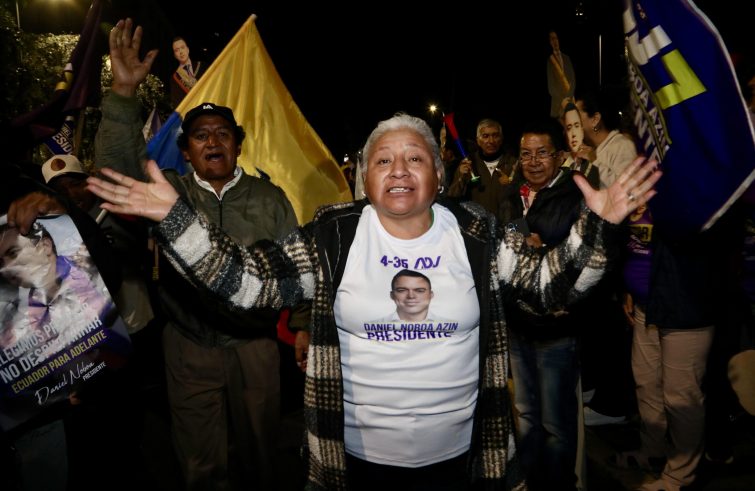
Daniel Noboa was re-elected in Ecuador’s presidential run-off, defeating Luisa González for the second time in a row. The outgoing president, who has championed a right-wing political programme, economic liberalism (he is the heir of the country’s banana tycoon), supports militarisation and the use of an iron fist in the fight against crime – with disappointing results so far – won a landslide victory by a margin of around 11 percentage points (55.69% against 44.31%) over the left-wing candidate aligned with former president Rafael Correa, who emerged victorious in just the two provinces of Manabí and Los Ríos, both traditional Correa strongholds. Noboa won by a landslide in Quito and narrowly prevailed in Guayaquil, where his opponent had won in the first round. The outgoing president was victorious also in the Amazon provinces, home to a large indigenous population.
Surprising results after the first round. Overall, the election results were surprising. The two candidates were almost neck and neck in the first round, and the opinion polls, as well as the first exit polls, showed an even race. For this very reason, González refused to concede Noboa’s victory, claiming electoral irregularities and demanding a recount. This request was motivated more by frustration than any realistic hope of overturning the results, given the scale of Noboa’s success. “Never before has the country been so polarised and so deeply divided,” Professor Damiano Scotton from Camposampiero in Padua, Italy, Professor of International Relations at the University of Azuay in Cuenca, told SIR. “As is well known, the last decade has been marked by the long presidency of the left-wing leader Rafael Correa. The last two presidential elections resulted in a strong polarisation between the supporters of the former president and his opponents, who prevailed. This time, the polarisation was not limited to personal confrontation, since there were two extreme political camps against each other, both characterised by a high degree of populism.”
The country was divided not only along Correa’s lines, but also along those of the young outgoing president, Daniel Noboa, as was clear in the first round.
In the end, however, the country’s political heartland decided to reject Correa yet again, his profile clearly trailing behind González, and preferred to continue supporting Noboa, who, after all, only had a year and a half to try to implement his programme. In fact, President Guillermo Lasso’s presidency, which began in 2021, was interrupted in 2023 by his resignation and the subsequent presidential elections. The country’s constitution, however, stipulates that elections must be held at the natural end of a presidential term, resulting in a new, tight election campaign. The country suffered an unprecedented wave of violence and terror over the past year and a half. The state of emergency declared by Noboa brought only temporary respite. The number of murders, especially in the Pacific provinces, began to rise again in 2025. Citizens nevertheless decided to place their trust in the young president, whose actions, not always respectful of human rights, will have to be closely monitored.
The Left ‘betrayed’ by the indigenous people. Noboa’s success can be explained in at least two ways. “The vote of the indigenous people proved decisive,” Scotton remarked. “Leonidas Iza, president of Conaie, the country’s main indigenous organisation and leader of the Pachakutik party, which won more than 5% of the vote in the first round, had recommended voting for the left-wing candidate – although not all the organisation’s leaders agreed.
The diesconnect between the leadership and the indigenous population was evident at the polling stations, and was confirmed by the election results in the Amazon provinces. Moreover, during his years in office there were strong tensions between the indigenous population and Correa, which have been hard to reconcile.”
The second aspect is Correa’s presence, which despite his contribution to Ecuador’s evolution, is confirmed as divisive throughout the country. After three consecutive defeats, like it or not, a progressive agenda will only have a chance of success in Ecuador in the future if it is separated from the former president’s legacy.
The bishops’ message. The Bishops’ Conference of Ecuador (CEE) called on all candidates to “accept the will of the people and commit themselves to work together in accordance with the rule of law, the separation of powers and the duly alternation of power.” The message signed by CEE president Cardinal Luis Gerardo Cabrera Herrera, Archbishop of Guayaquil, and all members of the presidency, reads: “This is our opportunity, as citizens, to write a new chapter in the history of Ecuador with our vote.” It was a wish and a heartfelt appeal that has not yet been accepted by the candidates: “The pressing nature of the current situation demands that we rediscover a spirit of fraternity and friendship, free from hatred, resentment and parochial interests,” they write in the statement, exhorting the nation to rediscover a common spirit of national fraternity. “There is no time to lose,” the bishops warn. “Recognising that we need each other is an ethical and political obligation, it is not just an election catchphrase or an advertising banner.” The bishops appealed to the future leaders to prioritise job creation, healthcare and education, the care of our common Home and the implementation of pro-family policies and measures to protect the most disadvantaged members of society.












